[ 093 ]
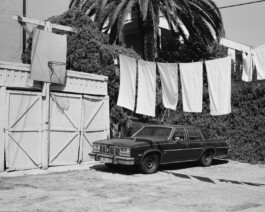
1
Ayda Gragossian (IR),
Nimbostratus
Los Angeles, California (US)
(1) Please introduce yourself: What is your name, where are you from, what do you do?
My name is Ayda Gragossian, and I am a Los Angeles based Iranian-Armenian photographer. I was born in Iran and I spent most of my childhood in Tehran. Growing up, I also lived in Perth, Western Australia, from which I carry the fondest of memories with me. I moved to Los Angeles in 2007 to pursue an education in art, but I have also lived in Vienna and Oxford. I am currently back in Los Angeles, where I work as a photographer and a museum educator.
(2) What is your relationship with photography and how did you get into it?
My love for photography came from working in the darkroom during my undergraduate program. I would spend hours in the darkroom, printing and experimenting, but I never felt confident in presenting my photographs outside those classes. At the time, I was studying painting at university. I used to make collages with my photographs, superimposing elements from the different cities that I had lived in to establish a dialogue between the past and present. I was constantly trying different ways to incorporate my photographs into the collages. It wasn’t until the end of graduate school in 2018 that I started to focus solely on photography.
(3) What do you think triggers you to photograph in a certain moment? Is it planned or solely driven by intuition?
In his essay Walking in the City, the French philosopher Michel de Certeau argues that the city can be experienced in two ways: observing (voyeurship) and walking (flânerie). I am always attentive during my daily drives, looking for potential subjects or scenes. When I don’t have my camera, I mark a potential location on my phone to return to at some point to make the photograph. The process is more intuitive when I am afoot. I do not follow a map or plan a route, but like to navigate the streets aimlessly. The photographs then become a combination of observed and lived experiences.
(4) What is the story you want your pictures to tell?
I want my photographs to confront the common misperception I feel some people have of Los Angeles, and portray what I encounter every day. The car-bound environment encourages a reclusive urban experience that overlooks certain marginalized realities and narratives that are best accessed on foot. Blurring the lines between urban and suburban areas, my photographs become a survey of fringe destinations that are ignored by those confined to their cars. The goal is not to create a coherent image of the city, but to depict fragments that reveal some of the unlikely and unobtrusive aspects of it.
(5) Which city would you like to visit the most, and why?
That’s a tricky question because the list is long and divided into two. There are cities like Vienna that I always want to come back to. I fell in love with Vienna when I briefly lived there in 2007. Returning there is always an enormous pleasure for me. There are also those cities I have never been to. I am now so accustomed to the grid system that I yearn to get lost within the ancient and labyrinthine alleyways of the Medina of Fez, or to wander through the diverse neighborhoods of Tokyo where traditional stalls and concrete towers intertwine.
(6) What is your personal relationship to cities and how do you perceive them as places in general?
I believe my affection for the built environment comes from growing up in a megacity like Tehran. For the last few months, before I left for the U.S., I managed to walk every Wednesday from Tajrish Square to Mirdamad Square down Shariati Street. The 5 km walk was empowering, and I felt incredibly independent. I knew I was leaving, and I wanted to take in as much as possible, but I didn’t record any of it. I enjoy being in big cities with bustling streets and efficient public transportation. Large cities are often associated with anonymity, but they also offer a collective identity that binds together people of different cultures and interests. I have also enjoyed living in smaller cities; therefore, I think for me, the most important aspects of a city, regardless of their size, are its accessibility and walkability. As I mentioned earlier, I lived in Oxford for two years, where a simple stroll to the center not only felt safe at any hour but brought me immense pleasure. Recognizing strangers on the street always put a smile on my face. They were my secret acquaintances. Los Angeles, on the other hand, is a city of destinations. While these destinations offer a myriad of possibilities and opportunities to the city’s four million inhabitants, the prospects of serendipitous finds and spontaneous encounters are reduced when the in-between is ignored. It is these peripheries that can educate, inspire, motivate, and move us.
(7) Regarding your project Nimbostratus: What was your intention, and how did you come up with the idea?
I came back to the suburbs of Los Angeles after completing my MFA in the UK. Despite having lived here for many years, I felt a grim sense of isolation and alienation exacerbated by the suburbs’ inaccessibility. Los Angeles is often seen as a unified space of glamour because of its iconic entertainment industry. In reality, it is a collection of different neighborhoods that constitute sprawling suburbs. Some of these are the most expensive zip codes in the country, but others are in a state of decay. I found this contrast intriguing. I never thought I could make a series about LA, but returning helped me see it anew. While Los Angeles has been photographed excessively, not many women have used a documentary approach to capture its urban landscape. I was interested in not only exploring the physical space but in understanding its social and cultural implications in relation to my own experiences, thoughts, and feelings. I chose a monochromatic palette which, combined with the bright Southern California light, evokes a sense of neglect and segregation. Meanwhile, the title sardonically alludes to the technical term for rain-bearing clouds, challenging the contradictory aura of the second-largest metropolis in the United States.
(8) What is that «one thing» you have never managed to photograph and is now gone for good?
A couple of years ago, during a short trip to San Diego, I saw a partially demolished bridge looming over the freeway. The top of the bridge, where a car might have taken a leisurely drive not so long ago, was sliced in half, and rebar dangled from the incision. The post-apocalyptic sight was stunning, but I did not have my camera to photograph it. When I returned, the other half was also torn down, leaving no traces of the colossal structure that once appeared so fragile.
(9) What do you prefer saying: To «take a photograph» or to «make a photograph», and why?
To make a photograph! Taking a photograph implies an element of accident associated with photography, but there are many decisions involved in crafting an image that go beyond the fortuitous.
(10) What is the most interesting experience you have had while photographing?
In a city like Los Angeles, the presence of a person walking in some of its empty streets seems out of place. Usually, interactions amongst those few that are on foot are kept to a minimum. Now and then, someone will stop to make small talk. Sometimes they want to know about my camera or what I am photographing. Often they just want to talk to anyone who will listen. Last week I met a recording studio manager called Doug, who came out to tell me how happy he was to see me making pictures on his unassuming street. He owned the recording studio for over thirty years and wanted to share everything he knew about the neighborhood with me. He told me the burned building I was photographing used to be a delicious Thai restaurant that was then taken over by a guy who had five girlfriends and sold mediocre sandwiches and marijuana on the side. He then added his contentious speculation that the guy set the place on fire to scam the insurance company. I thought that would be the end of our conversation, but he went on to talk about music, burgers, and even tennis. I will probably never see Doug again, but such encounters in a place like LA, where people deliberately avoid one another, are what make the project interesting for me.
(11) If it wasn’t for photography, what would you be interested in doing instead?
I have taken a few detours and digressions in my life that have kept me from having a traditional trajectory in the arts, and I don’t want that to happen again. If photography wasn’t an option, I would have loved to be a writer or an illustrator of children's books.
Thank you, Ayda.
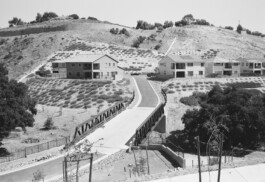
2
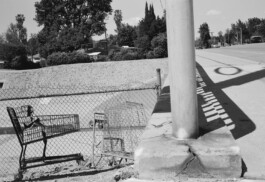
3
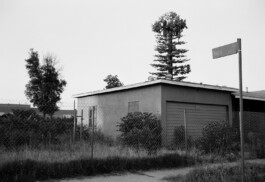
4
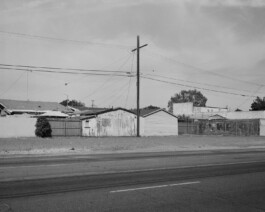
5
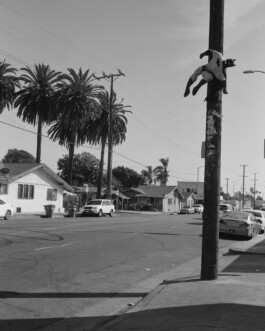
6
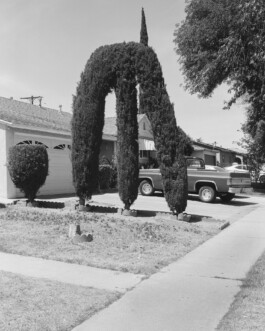
7
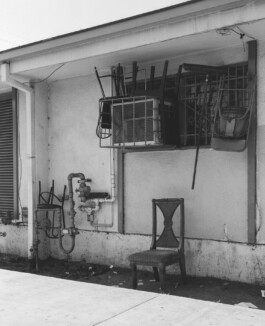
8
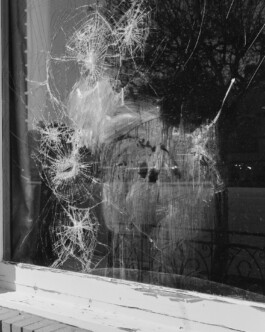
9
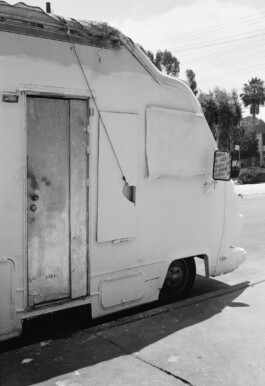
10
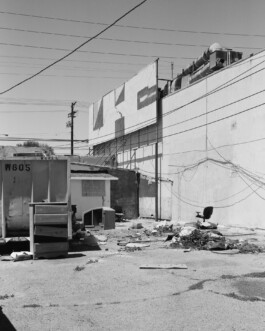
11
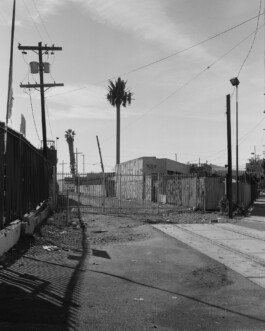
12
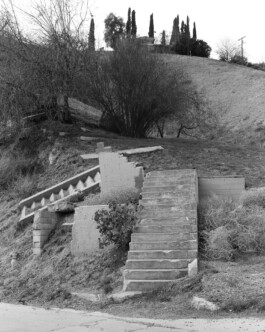
13
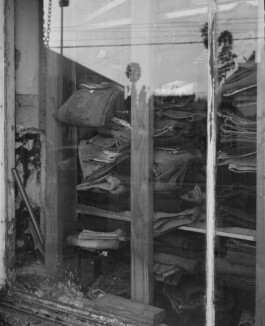
14
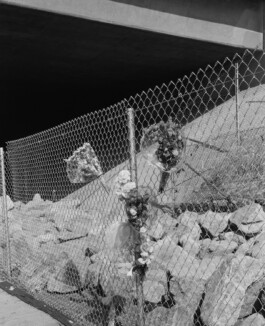
15
Images
1–15 Ayda Gragossian, Nimbostratus, Los Angeles, California (US) 2021.
Interview

1
Ayda Gragossian (IR),
Nimbostratus
Los Angeles, California (US)
(1) Please introduce yourself: What is your name, where are you from, what do you do?
My name is Ayda Gragossian, and I am a Los Angeles based Iranian-Armenian photographer. I was born in Iran and I spent most of my childhood in Tehran. Growing up, I also lived in Perth, Western Australia, from which I carry the fondest of memories with me. I moved to Los Angeles in 2007 to pursue an education in art, but I have also lived in Vienna and Oxford. I am currently back in Los Angeles, where I work as a photographer and a museum educator.
(2) What is your relationship with photography and how did you get into it?
My love for photography came from working in the darkroom during my undergraduate program. I would spend hours in the darkroom, printing and experimenting, but I never felt confident in presenting my photographs outside those classes. At the time, I was studying painting at university. I used to make collages with my photographs, superimposing elements from the different cities that I had lived in to establish a dialogue between the past and present. I was constantly trying different ways to incorporate my photographs into the collages. It wasn’t until the end of graduate school in 2018 that I started to focus solely on photography.
(3) What do you think triggers you to photograph in a certain moment? Is it planned or solely driven by intuition?
In his essay Walking in the City, the French philosopher Michel de Certeau argues that the city can be experienced in two ways: observing (voyeurship) and walking (flânerie). I am always attentive during my daily drives, looking for potential subjects or scenes. When I don’t have my camera, I mark a potential location on my phone to return to at some point to make the photograph. The process is more intuitive when I am afoot. I do not follow a map or plan a route, but like to navigate the streets aimlessly. The photographs then become a combination of observed and lived experiences.
(4) What is the story you want your pictures to tell?
I want my photographs to confront the common misperception I feel some people have of Los Angeles, and portray what I encounter every day. The car-bound environment encourages a reclusive urban experience that overlooks certain marginalized realities and narratives that are best accessed on foot. Blurring the lines between urban and suburban areas, my photographs become a survey of fringe destinations that are ignored by those confined to their cars. The goal is not to create a coherent image of the city, but to depict fragments that reveal some of the unlikely and unobtrusive aspects of it.
(5) Which city would you like to visit the most, and why?
That’s a tricky question because the list is long and divided into two. There are cities like Vienna that I always want to come back to. I fell in love with Vienna when I briefly lived there in 2007. Returning there is always an enormous pleasure for me. There are also those cities I have never been to. I am now so accustomed to the grid system that I yearn to get lost within the ancient and labyrinthine alleyways of the Medina of Fez, or to wander through the diverse neighborhoods of Tokyo where traditional stalls and concrete towers intertwine.
(6) What is your personal relationship to cities and how do you perceive them as places in general?
I believe my affection for the built environment comes from growing up in a megacity like Tehran. For the last few months, before I left for the U.S., I managed to walk every Wednesday from Tajrish Square to Mirdamad Square down Shariati Street. The 5 km walk was empowering, and I felt incredibly independent. I knew I was leaving, and I wanted to take in as much as possible, but I didn’t record any of it. I enjoy being in big cities with bustling streets and efficient public transportation. Large cities are often associated with anonymity, but they also offer a collective identity that binds together people of different cultures and interests. I have also enjoyed living in smaller cities; therefore, I think for me, the most important aspects of a city, regardless of their size, are its accessibility and walkability. As I mentioned earlier, I lived in Oxford for two years, where a simple stroll to the center not only felt safe at any hour but brought me immense pleasure. Recognizing strangers on the street always put a smile on my face. They were my secret acquaintances. Los Angeles, on the other hand, is a city of destinations. While these destinations offer a myriad of possibilities and opportunities to the city’s four million inhabitants, the prospects of serendipitous finds and spontaneous encounters are reduced when the in-between is ignored. It is these peripheries that can educate, inspire, motivate, and move us.
(7) Regarding your project Nimbostratus: What was your intention, and how did you come up with the idea?
I came back to the suburbs of Los Angeles after completing my MFA in the UK. Despite having lived here for many years, I felt a grim sense of isolation and alienation exacerbated by the suburbs’ inaccessibility. Los Angeles is often seen as a unified space of glamour because of its iconic entertainment industry. In reality, it is a collection of different neighborhoods that constitute sprawling suburbs. Some of these are the most expensive zip codes in the country, but others are in a state of decay. I found this contrast intriguing. I never thought I could make a series about LA, but returning helped me see it anew. While Los Angeles has been photographed excessively, not many women have used a documentary approach to capture its urban landscape. I was interested in not only exploring the physical space but in understanding its social and cultural implications in relation to my own experiences, thoughts, and feelings. I chose a monochromatic palette which, combined with the bright Southern California light, evokes a sense of neglect and segregation. Meanwhile, the title sardonically alludes to the technical term for rain-bearing clouds, challenging the contradictory aura of the second-largest metropolis in the United States.
(8) What is that «one thing» you have never managed to photograph and is now gone for good?
A couple of years ago, during a short trip to San Diego, I saw a partially demolished bridge looming over the freeway. The top of the bridge, where a car might have taken a leisurely drive not so long ago, was sliced in half, and rebar dangled from the incision. The post-apocalyptic sight was stunning, but I did not have my camera to photograph it. When I returned, the other half was also torn down, leaving no traces of the colossal structure that once appeared so fragile.
(9) What do you prefer saying: To «take a photograph» or to «make a photograph», and why?
To make a photograph! Taking a photograph implies an element of accident associated with photography, but there are many decisions involved in crafting an image that go beyond the fortuitous.
(10) What is the most interesting experience you have had while photographing?
In a city like Los Angeles, the presence of a person walking in some of its empty streets seems out of place. Usually, interactions amongst those few that are on foot are kept to a minimum. Now and then, someone will stop to make small talk. Sometimes they want to know about my camera or what I am photographing. Often they just want to talk to anyone who will listen. Last week I met a recording studio manager called Doug, who came out to tell me how happy he was to see me making pictures on his unassuming street. He owned the recording studio for over thirty years and wanted to share everything he knew about the neighborhood with me. He told me the burned building I was photographing used to be a delicious Thai restaurant that was then taken over by a guy who had five girlfriends and sold mediocre sandwiches and marijuana on the side. He then added his contentious speculation that the guy set the place on fire to scam the insurance company. I thought that would be the end of our conversation, but he went on to talk about music, burgers, and even tennis. I will probably never see Doug again, but such encounters in a place like LA, where people deliberately avoid one another, are what make the project interesting for me.
(11) If it wasn’t for photography, what would you be interested in doing instead?
I have taken a few detours and digressions in my life that have kept me from having a traditional trajectory in the arts, and I don’t want that to happen again. If photography wasn’t an option, I would have loved to be a writer or an illustrator of children's books.
Thank you, Ayda.

2

3

4

5

6

7

8

9

10

11

12

13

14

15
Images
1–15 Ayda Gragossian, Nimbostratus, Los Angeles, California (US) 2021.